Products You May Like
Size isn’t everything when it comes to a football stadium being impressive but it can certainly help provide an unrivalled atmosphere.
Football’s most iconic arenas, no matter the continent or country, often boast the ability to house a huge number of supporters. When packed to the rafters with tens of thousands of passionate fans, these stadiums can produce deafening noises capable of measuring on the Richter scale.
For some, journeying across the globe to tick off these legendary venues is like a spiritual pilgrimage, but you would leave quite the footprint if you attempted to visit the ten largest stadiums in world football.
Here are the grounds with the biggest capacities worldwide.
Location: Dallas, United States
Capacity: 92,100
The Cotton Bowl Stadium has hosted plenty of football matches over the years, calling itself home to Dallas Tornado and Dallas Burn (now FC Dallas) in the past. From 2024/25, it will be the home of women’s side Dallas Trinity for their inaugural season in the USL Super League.
The gigantic 92,100-capacity stadium hosted six matches at the 1994 FIFA World Cup, most prominently a 3-2 victory for Brazil over the Netherlands in the quarter-final of the competition.
It used to host semi-regular United States men’s national team matches but hasn’t been used a venue for the Stars and Stripes since 2004.


Location: Pasadena, United States
Capacity: 92,800
California is home to the Rose Bowl, well known for hosting the college football Rose Bowl game every New Year’s Day. However, in terms of our football, it’s most remembered for hosting the 1994 World Cup final in which Roberto Baggio slammed that penalty over the crossbar.
It also hosted LA Galaxy for six years before they left in 2002, while it’s regularly put on pre-season friendly clashes for some of Europe’s elite teams.


Location: Cairo, Egypt
Capacity: 93,940
The newest stadium in the top ten by quite some distance, the New Administrative Capital Stadium only opened its doors in January 2024. The first match wasn’t played until March, with Egypt hosting New Zealand in an the 2024 ACAD Cup.
The almost 94-000 seater stadium is the second largest in Africa and makes up part of Egypt’s Olympic Sports City in Cairo. The arena could be useful in future bids for major sporting events, including the World Cup.
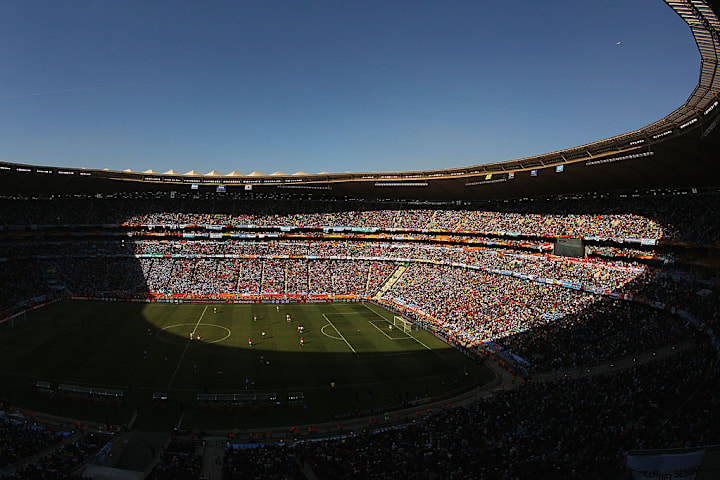

Location: Johannesburg, South Africa
Capacity: 94,736
The First National Bank Stadium, which is also referred to as Soccer City, is the largest stadium in Africa with a capacity of almost 95,000. It’s the home of the Kaizer Chiefs, one of South Africa’s biggest clubs, and was also readily used at the 2010 World Cup.
It’s increased in size by almost 10,000 seats since the World Cup, where it hosted the final between Spain and the Netherlands. Three years later it staged the African Cup of Nations final between Nigeria and Burkina Faso, and it was the venue in which Nelson Mandela gave his first speech in Johannesburg following his release from prison in 1990.
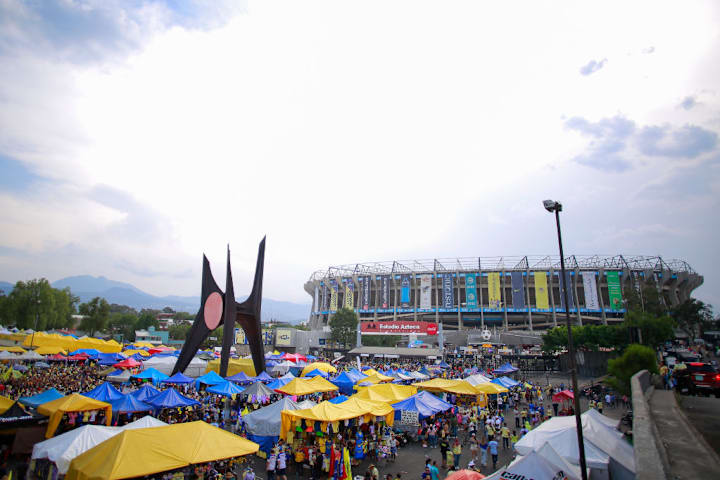

Location: Mexico City, Mexico
Capacity: 95,500
Estadio Azteca is one of football’s most famous stadiums in world football and is the home of Mexican outfit Club America, as well as the Mexico national team.
It was the first arena to stage two World Cup finals, with the first coming in 1970 when Brazil beat Italy 4-1. The second came 16 years later as Diego Maradona inspired Argentina to glory, and the arena hosted the quarter-final which saw the diminutive South American score the famous ‘Hand of God’ goal against England.
The stadium will also host matches at the 2026 World Cup, although it will share duties with venues in Canada and, chiefly, the United States.


Location: Barcelona, Spain
Capacity: 99,354
Barcelona‘s men’s team are currently playing their home matches at Estadi Lluis Companys as the Camp Nou is renovated and La Blaugrana will be keen to return to their enormous home as soon as humanly possible.
The venue for all of Barcelona’s amazing triumphs since 1957, it hosted the Catalan giants after they left their previous home of Camp de Les Corts. It’s still the biggest stadium in Spain and Europe, housing just under 100,000 spectators at its peak.
Unsurprisingly, five games at the 1982 World Cup were played at Camp Nou, including the semi-final between Poland and Italy.


Location: Melbourne, Australia
Capacity: 100,024
This isn’t a trick. Melbourne Cricket Ground, as the name suggests, hosts plenty of Cricket, while also staging Australian rules football, rugby union and rugby league. However, it does host football, too.
It has been the venue used by the Australian men’s national team on many occasions in the past, while touring European sides have held friendly matches there in front of bumper crowds. Newcastle United and Tottenham Hotspur’s post-season friendly in May 2024 was played at the ground.
Several matches at the 2032 Summer Olympics are set to be played in the 100,024-capacity stadium.
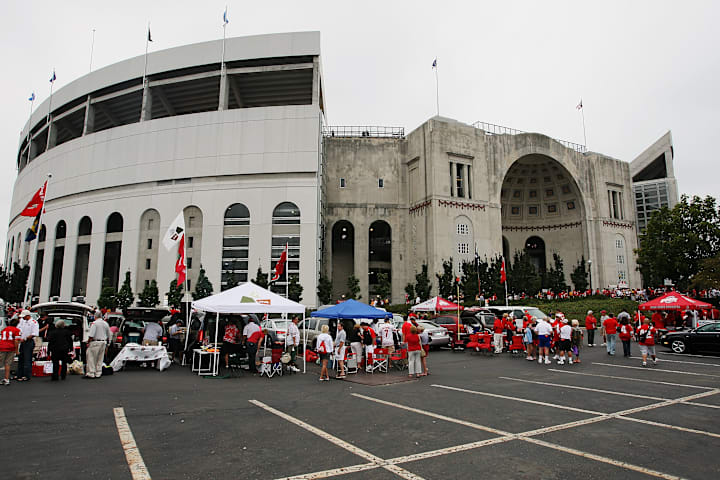

Location: Columbus, United States
Capacity: 102,780
Returning to the United States, we have Ohio Stadium in Columbus. It’s currently used by American football college side Ohio State Buckeyes but it was formerly the home of Major League Soccer outfit Columbus Crew between 1996 and 1998.
However, Columbus Crew’s opening fixture at the venue attracted just over 25,000 fans and the club vacated the arena when the Columbus Crew Stadium was constructed in 1999.
Manchester City’s 4-2 victory over Chelsea during 2024/25 pre-season was staged at Ohio Stadium, with Erling Haaland adding another hat-trick to his tally.
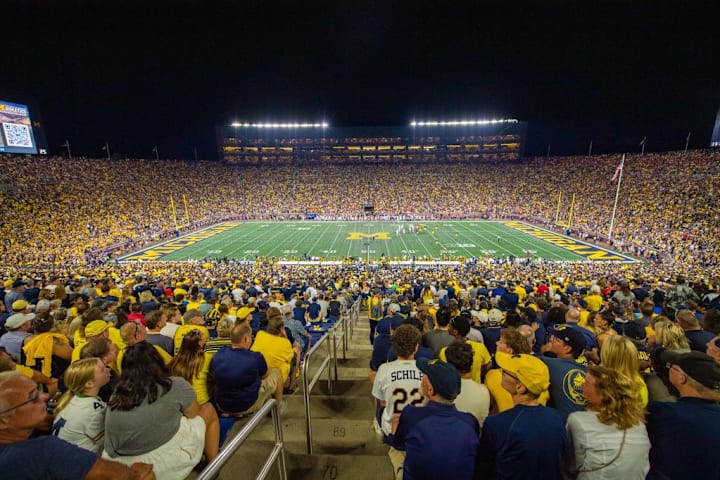

Location: Ann Arbor, United States
Capacity: 107,601
Michigan Stadium is massive. It’s the biggest venue in the United States and the third-largest stadium of any description across the globe. It has an incredible capacity of almost 108,000 people, with crowds having reached 115,000 in the past.
In fact, the United States’ record crowd for a soccer match came at Michigan Stadium when a friendly between Real Madrid and Manchester United saw 109,318 people take to their seats.
Michigan Wolverines play American college football at the stadium and it has only been sparingly used to stage soccer matches in the past. It’s also hosted occasional ice hockey games.
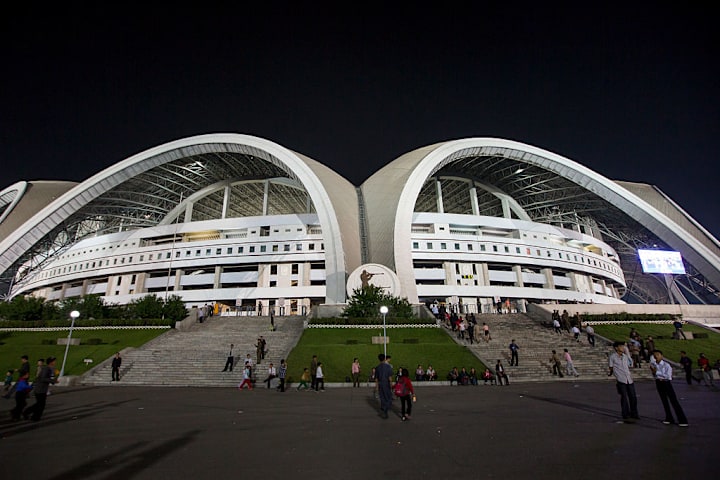

Location: Pyongyang, North Korea
Capacity: 114,000
A multi-purpose venue in Pyongyang, North Korea, the Rungrado 1st of May Stadium opened in 1989 and can now home a maximum of 114,000 people. While used to host a variety of sporting events, it’s also been utilised as an arena for political speeches to mass audiences.
North Korea’s men’s and women’s national teams call the stadium their home but it also hosted the world’s largest gymnastics display and wrestling event ever.
There are claims that the venue could yet be expanded to fit 150,000 people.
